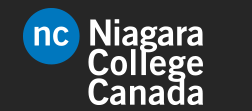About Environmental Technician – Field And Laboratory (co-op) in Niagara College
Are you passionate about environmental conservation and a career where you can make a meaningful impact on the world?
As an Environmental Technician graduate you will work in the field and lab to protect and preserve environmental wetlands, water supplies and other natural habitats.
Highlights
-
Gain hands-on experiential training working on a 125-acre campus that features living and environmental labs comprised of 15 acres of student-restored wetlands and Canada’s first nationally recognized postsecondary wildlife sanctuary.
-
Gain practical experience via a co-op work term through our partnership with the Niagara Peninsula Conservation Authority and environmental applied research opportunities with government and industry partners.
-
Graduate with additional credentials: Drinking Water Operator (Ministry of the Environment), Canadian Environmental Practitioner in Training (CEPIT), Water Quality Analyst (WQA), and Ontario Association of Certified Engineering Technicians & Technologists (OACETT) certification.
-
Graduates can pursue Niagara College graduate certificates in Ecosystem Restoration, Environmental Management and Assessment and Geographic Information Systems – Geospatial Management.
Our Niagara-on-the-Lake campus is the first postsecondary institution in Canada to be recognized as a Certified Audubon Cooperative Sanctuary.
Career Opportunities
Graduates can work at diverse locations including community outreach organizations; conservation authorities; environmental labs; and government ministries.
- Biological technologist or technician
- Chemical technologist or technician
- Environmental technician or technologist
- Natural and applied science consultant, policy researcher, or program officer
Academic qualification equivalents
English language requirements (one of the below):
- IELTS : 6 (No Individual band under 5.5)
- TOEFL : 79 with 20 in Writing and 20 in Speaking
- PTE : 53-57
Niagara college Highlights
| Type of College |
Public |
| Establishment Year |
1967 |
| Type of Campus |
Urban |
| Housing |
Available |
| Number of Programs |
130+ |
| Number of Campuses |
2 |
| Full-time Students |
12,000+ |
| International Students |
4,700+ |
| Intake Seasons |
Fall, Winter, Spring |
Niagara College Average Tuition Fees And Other Expenses
The cost of attendance includes tuition fees, accommodation costs, and other expenses. The tables mentioned below will help international students estimate their cost of living in Canada.
Niagara College Tuition Fee
| Program |
Tuition Fee(per year) |
| Diploma/Certificate |
13,350-14,550 CAD |
| Undergraduate Degree |
14,550 CAD |
| Graduate |
16,550 CAD |
The cost of attendance is different for international students studying at Niagara College than the domestic students.
Accommodation
NC provides many housing facilities to their students on both their campuses. Students can also consider renting rooms, houses or sublets along with other students who are looking for housemates.
| Category |
Expense (per year) |
| Double Occupancy Suite |
7,400 CAD |
| Quad Occupancy Suite |
3,840 CAD |
| Homestay |
9,000 CAD |
International students also have the following options for stay while they study in Canada:
- Homestays- International students can reside with a Canadian family once they have received confirmation from them.
- Landing Pad- Niagara College Landing Pad accommodates International students for 30 days, including two meals per day.
The college helps the new students with information and ease the adjustment process with the new country.
Other Expenses
| Service Fee |
632 CAD per term |
| Medical Insurance |
70 CAD per month |
| Bus fee |
192.50 CAD per term |
| Books and Supplies |
2,500 CAD |
| Personal and Miscellaneous Expenses |
2,000-8,000 CAD |
A 500 CAD tuition deposit is required of all incoming and renewing students. A spot in the programme must be secured with this deposit. This charge is a component of the tuition fee, lowering the overall amount of tuition due.
Niagara College Admissions Application
Candidates that qualify for early admission are given preference (subject to programme capacity). Those who don't meet the requirements for early admission may still be eligible for admission through the competitive admissions process. The basic requirements, however, do not ensure admittance.
| Where to Apply |
Online Application Portal |
| Application Fee |
100 CAD |
| Application Deadlines for International Students(Recommended) |
Spring 2020: October 30, 2020; Fall 2020: February 1, 2020; Winter 2021: June 8, 2020 |
| Documents Required |
Transcripts, LOR, SOP |
| English Language Requirement |
IELTS: Overall 6.5(no band under 5.5)
TOEFL PBT: 550
TOEFL iBT: 79 - 80(minimum 22 in writing and speaking) |
